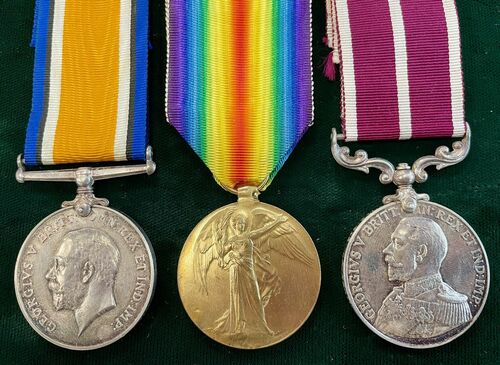
Auction: 24001 - Orders, Decorations and Medals
Lot: 139
A Great War Royal Navy M.S.M. group of three to awarded to Motor Mechanic W. A. Searle, Royal Navy, who was involved in the sinking of a U-Boat on 5 July 1916 on the Motor Boat Salmon
British War and Victory Medals (M. B. 613 W. A. Searle. M.B. R.N.V.R.); Royal Naval Meritorious Service Medal, G.V.R. (M.B.613. W. A. Searle. M.M. R.N.V.R. "Salmon" North Sea 5 July 1916), good very fine (3)
M.S.M. London Gazette 24 March 1919.
William Arthur Searle was born at Feock, Truro, Cornwall, on 9 September 1882. He was a Mariner by profession according to his entry of the 1911 census. He enlisted into the Royal Naval Volunteer Reserve on 28 November 1915, serving on the Motor Boat Resourceful until 10 January 1916. He then served on Hermione firstly between 11 January 1916 - 24 February 1916 and after a brief spell of service on Vivid III again between 28 April 1916 - 8 May 1916. Followed by service on Halycon for the duration of his service which concludes on 3 June 1919. He qualified as a Hydrophone Listener on 17 May 1918.
In a letter from Naval Base, Lowestoft sent 11 July 1916:
'Sir,
Be pleased to inform Their Lordships that, during the night of the 5th instant, the motor boat "Salmon" (specially fitted with hydrophone and a locally made depth charge) was patrolling for submarines suspected to be near the War Channel. At 11p.m. G.M.T. a buzzing noise was heard on the hydrophone. The "Salmon" then steered North for about ten minutes; engines were again stopped and the hydrophones placed overboard, but the buzzing had ceased. After half-an-hour's drifting, the buzzing was again heard, but much louder. The "Salmon" then steamed to the southward for ten minutes, stopped engines and drifted - the noise was found to be again stopped. After about forty minutes the buzzing once more commenced and seemed to be very close, rapidly approaching.
Sub-Lieutenant Temple West, R.N.V.R. could then hear very distinctly what appeared to be a dynamo running, getting very close. This approached until, within a few minutes, he was certain it was right underneath him. He immediately put his engines full speed ahead, and dropped his depth charge. this exploded about 100 yards astern of him, throwing the water up in a sort of bulge to a height of about ten feet. Almost immediately afterwards (estimated from three to four seconds) a terrific explosion occured, throwing a vast quantity of water up to a height of at least 50 feet.
A large number of bubbles came to the surface, and this continued for some time, and Sub-Lieutenant Temple West and the members of his crew noticed a strong smell of acetylene gas. The water appeared to be very oily, and what might have been taken for a tide rip appeared in the middle of a calm space. The position of this occurence is very uncertain, owing to the movements of the "Salmon" and the drift of the tide, but after the explosions the dead reckoning of the "Salmon" was seven miles North, then four miles North West, when the East Barnard Buoy was made ahead.
This would put the position in approximately 52 15'N., 1 54'E. On the 6th instant, a message was received from the Naval Centre, Hull, that the S.S. "Lady Ann" reported that at 10.40 a.m. she passed over a circle of oil 50 feet in diameter, midway between A and T buoys (Latitude 52 11 1/2'N., 1 47'E). The vicinity will be searched as soon as convenient.
Sub-Lieutenant Temple West reports that no more sounds were heard on the hydrophone after these two explosions. The explosion was so heavy that it has slightly affected Sub-Lieutenant West, who is suffering from violent headaches and whom I have sent on ten days' leave, and it also affected the crew of the boat in a lesser degree. It seems to have frightened them all considerably.
I have the honour to be,
Sir, Your obedient Servant, Commodore-in-Charge.'
Subject to 20% VAT on Buyer’s Premium. For more information please view Terms and Conditions for Buyers.
Sold for
£600
Starting price
£270




